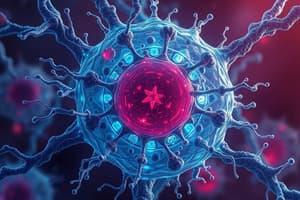Podcast
Questions and Answers
Which process describes how particles move from an area of higher concentration to an area of lower concentration?
Which process describes how particles move from an area of higher concentration to an area of lower concentration?
- Cell Fractionation
- Symbiosis
- Osmosis
- Diffusion (correct)
What type of organisms are autotrophs?
What type of organisms are autotrophs?
- Those that live symbiotically with others
- Those that cannot produce energy
- Those that make their own food (correct)
- Those that consume other organisms
In what type of competition do individuals of the same species compete for resources?
In what type of competition do individuals of the same species compete for resources?
- Intraspecific competition (correct)
- Predation
- Commensalism
- Mutualism
What is a characteristic feature of prokaryotic cells?
What is a characteristic feature of prokaryotic cells?
Which term describes a situation where one organism lives on or inside another and harms it?
Which term describes a situation where one organism lives on or inside another and harms it?
Flashcards
Cell Culture
Cell Culture
The process of growing cells outside their natural environment under controlled conditions.
Cell Fractionation
Cell Fractionation
The process of separating different parts of the cell.
Centrifuge
Centrifuge
A device that separates different parts of the cell.
Intraspecific competition
Intraspecific competition
Signup and view all the flashcards
Interspecific competition
Interspecific competition
Signup and view all the flashcards
Study Notes
Homeostasis
- Homeostasis is a process for maintaining a stable internal environment, like regulating temperature and glucose levels.
Autotrophs and Heterotrophs
- Autotrophs produce their own food (e.g., plants).
- Heterotrophs obtain energy by consuming other organisms (e.g., humans).
Cell Specialization
- Cells in an organism can develop different functions.
Cell Culture
- Cell culture involves growing cells outside their natural environment in a controlled setting.
Cell Fractionation
- Cell fractionation is a technique to separate different cellular components.
Centrifuge
- A centrifuge is a device that separates cellular components based on density.
Competition
- Intraspecific competition occurs between members of the same species.
- Interspecific competition takes place between different species.
Predation
- Predation is when one organism captures and consumes another.
Symbiosis
- Symbiosis describes a close relationship between two species.
Mutualism
- Mutualism benefits both interacting species.
Commensalism
- Commensalism benefits one species without affecting the other.
Parasitism
- Parasitism benefits one species while harming the other.
Cell Structures
- Cell wall: An outer layer surrounding some cells, primarily plant cells, located outside the cell membrane.
- Cell membrane (plasma membrane): A double layer of lipids and proteins surrounding all cells.
Prokaryotes and Eukaryotes
- Prokaryotes lack a nucleus containing their genetic material (e.g., bacteria).
- Eukaryotes possess a nucleus containing their genetic material (e.g., animals, plants).
Diffusion and Osmosis
- Diffusion is the movement of particles from a high concentration to a low concentration.
- Osmosis is the movement of water across a selectively permeable membrane.
Tonicity
- Hypertonic: Higher solute concentration than another solution.
- Hypotonic: Lower solute concentration than another solution.
- Isotonic: Equal solute concentration.
Lactic Fermentation
- Lactic fermentation is a metabolic process that converts glucose into cellular energy.
Studying That Suits You
Use AI to generate personalized quizzes and flashcards to suit your learning preferences.



